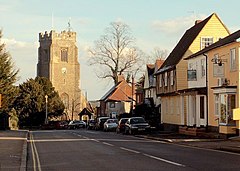Earls Colne
| Earls Colne | |
|---|---|
 |
|
| Earls Colne shown within Essex | |
| Population | 4,848 3,693 (2011) |
| OS grid reference | TL857289 |
| District | |
| Shire county | |
| Region | |
| Country | England |
| Sovereign state | United Kingdom |
| Post town | Colchester |
| Postcode district | CO6 |
| Dialling code | 01787 2 |
| Police | Essex |
| Fire | Essex |
| Ambulance | East of England |
| EU Parliament | East of England |
| UK Parliament | |
| Website | www.earlscolne.org |
Earls Colne is a village in Essex, England named after the River Colne, on which it stands, and the Earls of Oxford who held the manor of Earls Colne from before 1086 to 1703.
In the time of Edward the Confessor Earls Colne belonged to a Saxon noble named Wulfwine also recorded as Ulwin/Ulwine. Ulwin's whole estate was given to Aubrey de Vere by William the Conqueror. His grandson Aubrey de Vere III became the first Earl of Oxford in the mid-twelfth century.
The Earls had an ancient mansion called Hall Place standing near the site of the present Ashwells in Park Lane.
Edward de Vere, 17th Earl of Oxford mismanaged his finances and in 1583 the estate, then comprising the manor and park of seven hundred acres, were purchased from him by his steward Richard Harlakenden.
Earls Colne is one of the best recorded villages in the UK and has been the subject of a study undertaken between 1972 and 2002 by Professor Alan Macfarlane and his team from the Department of Social Anthropology at the University of Cambridge.
The resulting database contains a large part of the surviving records of the parish over the period 1380–1854. The manorial records have been transcribed from Latin and these together with the parish registers, tithe maps and Ralph Josselin's diary have been indexed by place, person and date.
In 1824 Robert Hunt, a millwright from Soham in Cambridgeshire, settled in Earls Colne and set up a millwrighting and wheelwrighting shop and smithy at what was to become the Atlas Works.
The business soon gained a local reputation for making general agricultural equipment and after exhibiting products at the Royal Agricultural Show in 1851 the company's products gained a country-wide recognition.
...
Wikipedia

